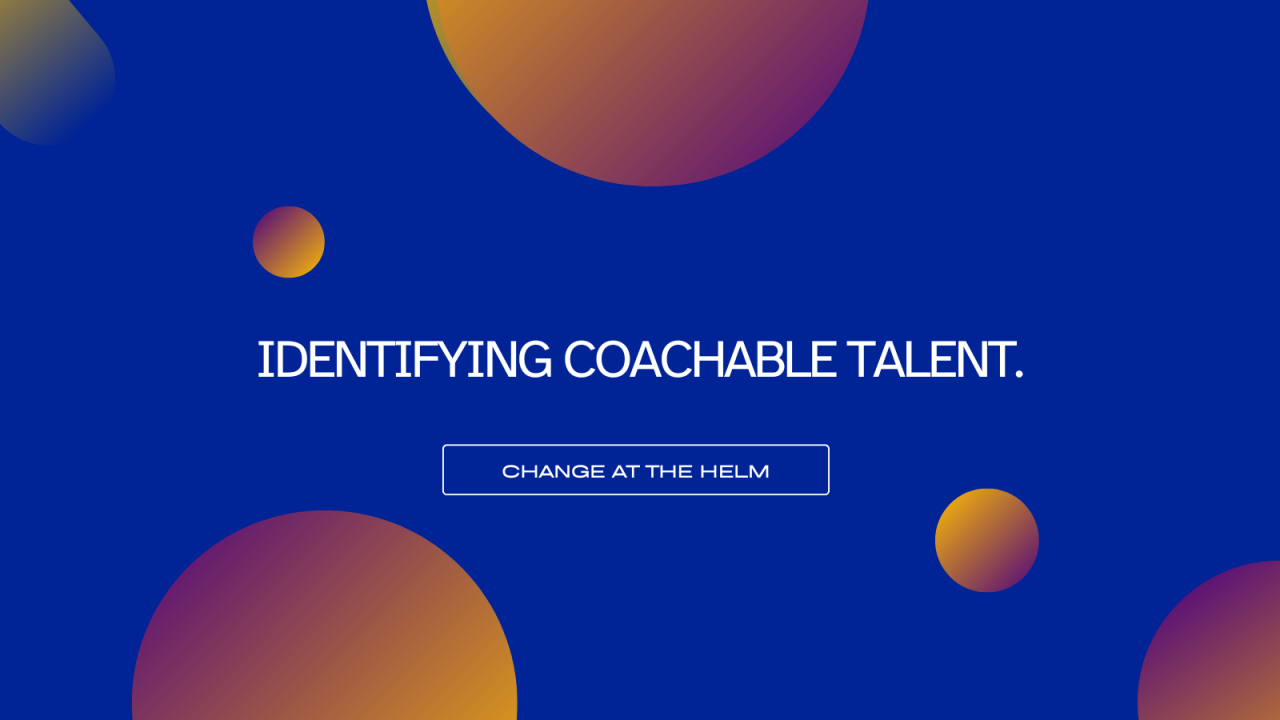
Unleashing Potential
Identifying and Nurturing Coachable Talent
In this edition of #ChangeAtTheHelm, let's dive into a critical aspect of coaching: identifying who is truly coachable under your specific guidance. This skill can make all the difference in a successful coaching relationship and maximizing your impact as a coach.
The Core of Effective Coaching - Identifying Coachable Talent
As a coach, your resources, including time, energy, and knowledge, are finite. To make the most impact, you need to strategically allocate these resources. This involves not just helping a single individual but fostering their growth in a way that they can cascade their learning and positively influence others in their network. Identifying those individuals who can proliferate the knowledge and skills they acquire from your coaching is a key part of this process. Recognizing who will flourish under your specific style of mentorship is crucial because it shapes how the coaching interactions will unfold, the degree of mutual understanding and trust, and the overall success of your coaching endeavors. This requires careful observation, listening skills, and an understanding of the potential coachee's personality, learning style, and personal goals.
Key Indicators of Coachability - What to Look For
So, what should you look for in a coachable individual? Certain traits and behaviors stand out, such as a willingness to learn, openness to feedback, and a proactive attitude. These indicators suggest that someone is open and receptive to coaching, which can significantly impact the coaching process. However, identifying these traits isn't always straightforward, and what may seem obvious in hindsight might not be clear ahead of time.
The most coachable individuals often demonstrate a strong sense of self-awareness, humility, and the ability to take responsibility for their actions. They are curious and eager to improve, constantly seeking new knowledge and skills. A coachable person actively seeks feedback and is not defensive when receiving it. Instead, they view it as an opportunity for growth.
The Match Matters - Ensuring Compatibility Between Coach and Coachee
Not everyone is coachable under every coach. Compatibility is key. Factors like personality alignment, communication styles, and shared values play a critical role in ensuring a productive coaching relationship. It's about finding the right match to create a synergistic partnership.
Building a successful coaching relationship also involves mutual respect and trust. A coach must be able to understand the coachee's goals and motivations and tailor their approach accordingly. When both parties are aligned and working towards a common goal, the coaching process becomes significantly more effective.
领英推荐
Usain Bolt and Mike Tyson – Lessons in Unique Coachability
Consider the case of Usain Bolt, the fastest sprinter in history. Conventional wisdom and regular observation methods might suggest that Bolt shouldn't be able to run as fast as he does. Researchers at Southern Methodist University discovered that Bolt's right leg strikes the track with about 13 percent more peak force than his left, and his left leg remains on the ground about 14 percent longer than his right leg. Despite this asymmetry, Bolt optimized his stride to become the fastest human, showing that what might seem like a disadvantage can be a unique strength.
Similarly, let's look at Mike Tyson. When Tyson entered the world of heavyweight boxing, many considered him too small to be a notable contender. Standing at 5'10" and heavily muscular, he was seen as too bulky to be fast and agile. Yet, Tyson defied these expectations with his explosive speed, powerful punches, and unparalleled agility. His coach, Cus D'Amato, recognized Tyson's unique potential and tailored his training to leverage these strengths, turning Tyson into one of the most formidable boxers in history.
These examples highlight that coachability isn't always obvious and requires a deeper understanding of an individual's unique traits and potential. As a coach, recognizing these nuances can lead to extraordinary results.
Takeaway
Being a great coach isn't just about having the right skills or knowledge, it's about finding those individuals who are truly open to your coaching style. The most impactful coaches are those who can identify self-aware, humble, and responsible individuals who don't just accept feedback but actively seek it out as a means for growth. However, spotting these traits isn't always easy. To truly understand someone's coachability, you need to delve into their unique characteristics and potential. Once you do, you're in a position to make a real difference with your coaching.
The latest edition of #ChangeAtTheHelm is out now! Dive in, explore, share, and engage. ????
Stay tuned for more insights and updates on tackling professional challenges! ????
Follow Niko V. Manoukian n and subscribe to #ChangeAtTheHelm: https://lnkd.in/dXkiZyA6 ?????
If you have any questions or need assistance, don't hesitate to reach out. ?????